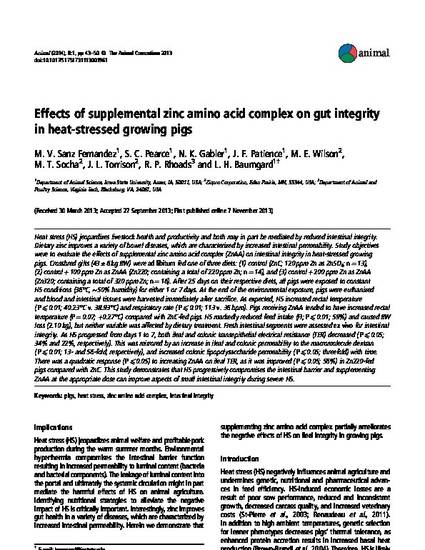
Heat stress (HS) jeopardizes livestock health and productivity and both may in part be mediated by reduced intestinal integrity. Dietary zinc improves a variety of bowel diseases, which are characterized by increased intestinal permeability. Study objectives were to evaluate the effects of supplemental zinc amino acid complex (ZnAA) on intestinal integrity in heat-stressed growing pigs. Crossbred gilts (43±6 kg BW) were ad libitum fed one of three diets: (1) control (ZnC; 120 ppm Zn as ZnSO4; n=13), (2) control+100 ppm Zn as ZnAA (Zn220; containing a total of 220 ppm Zn; n=14), and (3) control+200 ppm Zn as ZnAA (Zn320; containing a total of 320 ppm Zn; n=16). After 25 days on their respective diets, all pigs were exposed to constant HS conditions (36°C, ∼50% humidity) for either 1 or 7 days. At the end of the environmental exposure, pigs were euthanized and blood and intestinal tissues were harvested immediately after sacrifice. As expected, HS increased rectal temperature (P⩽0.01; 40.23°C v. 38.93°C) and respiratory rate (P⩽0.01; 113 v. 36 bpm). Pigs receiving ZnAA tended to have increased rectal temperature (P=0.07; +0.27°C) compared with ZnC-fed pigs. HS markedly reduced feed intake (FI; P⩽0.01; 59%) and caused BW loss (2.10 kg), but neither variable was affected by dietary treatment. Fresh intestinal segments were assessed ex vivo for intestinal integrity. As HS progressed from days 1 to 7, both ileal and colonic transepithelial electrical resistance (TER) decreased (P⩽0.05; 34% and 22%, respectively). This was mirrored by an increase in ileal and colonic permeability to the macromolecule dextran (P⩽0.01; 13- and 56-fold, respectively), and increased colonic lipopolysaccharide permeability (P⩽0.05; threefold) with time. There was a quadratic response (P⩽0.05) to increasing ZnAA on ileal TER, as it was improved (P⩽0.05; 56%) in Zn220-fed pigs compared with ZnC. This study demonstrates that HS progressively compromises the intestinal barrier and supplementing ZnAA at the appropriate dose can improve aspects of small intestinal integrity during severe HS.
Available at: http://works.bepress.com/john-patience/111/

This article is published as Fernandez, MV Sanz, S. C. Pearce, N. K. Gabler, J. F. Patience, M. E. Wilson, M. T. Socha, J. L. Torrison, R. P. Rhoads, and L. H. Baumgard. "Effects of supplemental zinc amino acid complex on gut integrity in heat-stressed growing pigs." Animal 8, no. 1 (2014): 43-50. doi:10.1017/S1751731113001961.